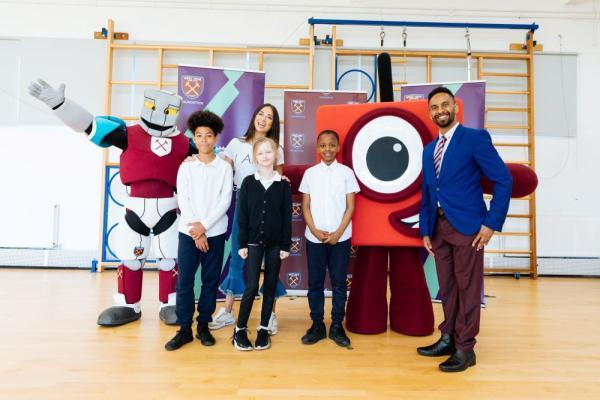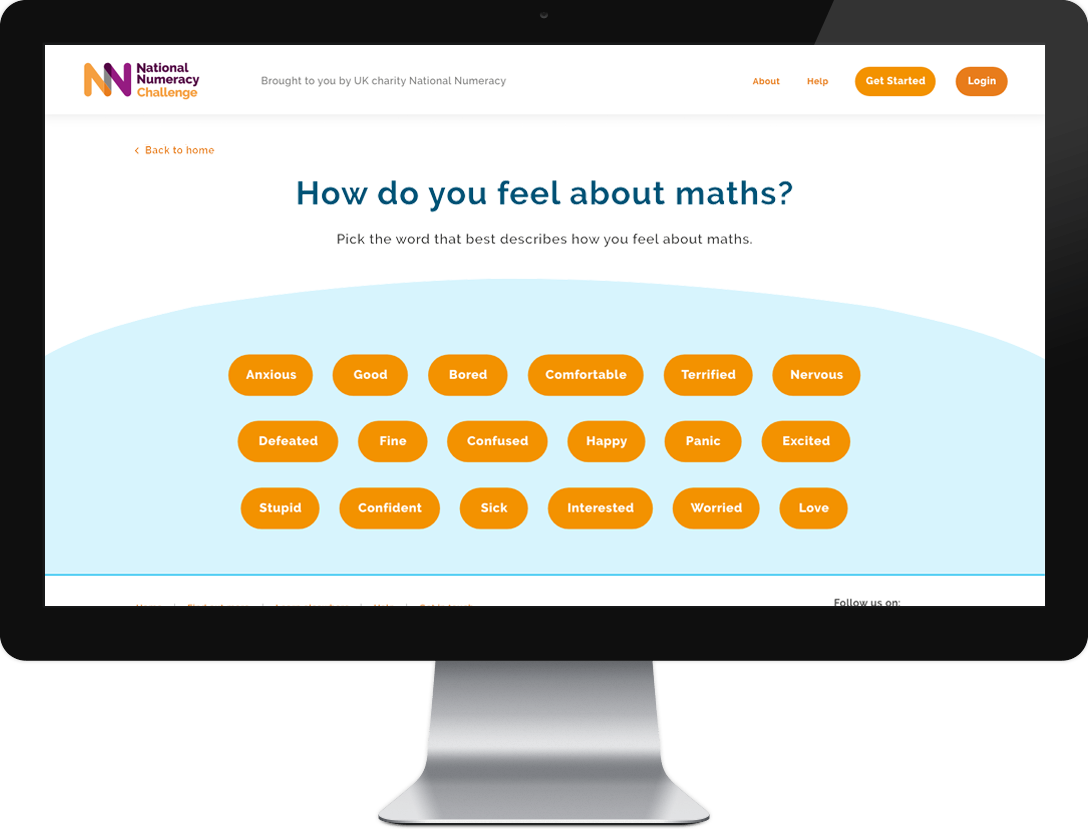Maths to 18' kicks off the year, and a 'love it or loathe it' debate
The year kicked off with Prime Minister Rishi Sunak’s January announcement of his ‘maths to 18’ policy.
National Numeracy responded with a statement expressing hope that the government would focus on the maths needed in real-life, outside of the classroom.
We also expressed our hope that every student, no matter what level of attainment, would be included and that teachers and educators would get the support needed to deliver improved numeracy for all.
The PM’s ‘maths to 18’ announcement kickstarted a vibrant conversation that raged throughout the year. Some ‘loved it’, others ‘loathed it’, but it got us all talking about the meaning of maths in our lives.
And among those loving it, were the 500,000 registered users for our online learning tool, National Numeracy Challenge – a fantastic milestone to hit in January.
One of those was Londoner Mark who told us how he was labelled ‘dumb’ and ‘lazy’ as a child but later found the confidence to become a Numeracy Champion.
From Parliament to TV's celebrity 'hunters'
In February, we heard how beneficial our partnership with Lincolnshire Co-Op is, with employees discovering the value of everyday maths and even becoming Numeracy Champions.
In March, National Numeracy CEO Sam Sims gave evidence to the House of Commons Education Select Committee about the proposals, saying we need to support young people to build number confidence and address the negative attitude towards maths that we have in the UK.
He also told the Committee about the need to reform the current GCSE system, which dooms many to failure every year.
We were glued to the TV cheering on our fantastic Ambassador Bobby Seagull who very nearly avoided being caught on Channel 4 series, Celebrity Hunted. Bobby explained how improving his numeracy helped him evade the ‘hunters’!
Our Corporate Volunteering programme reaches 12,000 children
Meanwhile our corporate volunteering programme was going from strength to strength. Kindly funded by Capital One, the unique programme supports positive attitudes towards numbers and maths in Key Stage 2 children, in areas of greatest need.
Dave Richards, Head of Corporate Responsibility at Capital One talked about what it means for colleagues to be involved right at the coal face of the issue that his company is addressing with National Numeracy.
By the end of the year our corporate volunteering programme has reached an incredible 12,000 children!
Tackling the 'anti-maths' mindset
In April the Prime Minister was adding meat to the bones of his ‘maths to 18’ approach, by making a speech about the UK’s ‘anti-maths mindset’. National Numeracy welcomed the sentiment, after all, we have been addressing the UK’s negative attitudes to maths since 2012. However, our response made it clear that addressing poor numeracy and anti-maths attitudes needs to begin much earlier than age 16.
As the UK’s only charity dedicated to everyday maths, we are always expanding the evidence around numeracy in the UK. April saw the launch of our Number Confidence and Social Mobility report.
The report findings included that women are significantly less confident with numbers than men and are disproportionally affected by negative experiences of maths at school. It also highlighted the crucial role number confidence has in getting in to and on at work.
National Numeracy Day 2023 is a smash hit
May always means one thing at National Numeracy: it’s National Numeracy Day!
This year, our sixth National Numeracy Day was overwhelmingly our biggest campaign to date. The star-studded campaign inspired people across the UK to take 831,050 actions towards improving numeracy, an 80% increase from last year’s record-breaking campaign.
The scale of this year’s engagement with National Numeracy Day shows there is a genuine grassroots desire from people across the country to boost their numeracy skills. This May, the number of organisations signing up to support National Numeracy Day rose 95% on 2022, with 9,369 schools, colleges, organisations and individuals taking part.
This year there were events happening all around the UK for National Numeracy Day with our local authority partners. From a maths bus travelling around Cambridgeshire and Peterborough to a day at Port Vale football club with Stoke- On-Trent, the number love spread like wildfire across the country.
Our Big Number Natter interview with best-selling author Peter James was the perfect example of how creative people use numeracy – countering the high-profile narrative that creative people don’t need numbers and ‘number people’ aren’t creative. In it, he explained how he uses numbers in both his work and life.
Meanwhile, with partner KPMG, we published new research that revealed over a third of adults (35%) say that doing maths makes them feel anxious, while one in five are so fearful it even makes them feel physically sick.
Making maths work for women and girls
How to make maths work for women and girls was a key theme throughout 2023. National Numeracy Ambassadors Rachel Riley, Katya Jones and Iona Bain shared their different experiences with numbers for our Big Number Natter initiative. They discussed our research findings, including that women are twice as anxious about maths as men (24% vs 12%) and gave their advice on how to change your approach to maths.
Meanwhile over 50,000 UK children took part in the first ever nationwide mass maths quiz, hosted by Bobby Seagull and fellow Ambassador Katya Jones.
Our campaign made it to Westminster, with the first ever National Numeracy Day Parliamentary Debate, with many politicians speaking about the importance of everyday numeracy including Shadow Schools Minister Stephen Morgan MP and the Minister for Schools, Nick Gibb.
Numeracy champions and Number Heroes...We have them all!
By June we were celebrating having trained 1,000 Numeracy Champions – a fantastic programme that trains people, not to teach maths, but to support their networks to feel more confident about numeracy.
We also celebrated success in Scotland, after a successful project with community learning practitioners and STEM Ambassadors, funded by Education Scotland.
In July we announced the winners of our Number Heroes competition, from the incredible 10,000 entries received.
The first of three webinars and accompanying research briefings was published in July – focussing on numeracy and gender. As the year progressed, webinars and briefings went on to cover work and confidence.
In August we had a deep dive in to the work we are doing with local authorities on the Multiply programme.
And in September, Bake Off winner and National Numeracy Ambassador Peter Sawkins told us how even he makes mistakes when it comes to baking! Just don’t mention soggy bottoms!
The UK Numeracy Index - highlighting low numeracy hot spots
October saw our UK Numeracy Index - the first ever model to predict and rank areas of the UK by numeracy skills and confidence – being shortlisted for the Data IQ Awards.
It was one of ten awards National Numeracy was shortlisted for this year, and we won four of them!
The UK Numeracy Index was developed with partner Experian and together with them and the National Literacy Trust, we held an event at the Labour Party Conference in Liverpool.
The link between mental health and maths is an area we have been exploring this year and will investigate more next year. Our in-house training officer Iain Evans blogged about maths anxiety and gave useful tips on how to overcome it.
Boosting lifelong numeracy through early intervention
Also this month, our data revealed that almost half of trainee teachers lack maths confidence or skills, or both.
The news coincided with a welcome announcement by Labour’s Shadow Education Secretary Bridget Phillipson of a plan to encourage stronger lifelong numeracy by boosting early intervention and “real world” maths teaching at primary school.
National Numeracy Ambassadors told us about their number mishaps. Financial educator Timi Merriman-Johnson told us about the time he ended up with far too much chicken takeaway due to mathematical errors!
And poet Harry Baker told us how a miscalculation over a wedding list saw him and his wife receive a ridiculously tiny baking tray as a gift! Everyone can struggle with their numbers, and that’s completely normal and OK! We can all improve too.
Dyscalculia - we are supporting people with 'numbers dyslexia'
A huge topic of conversation on our channels this year was dyscalculia – often called ‘number dyslexia’. Our Ambassador, Morning Live’s finance expert Iona Bain, has dyscalculia and is passionate about helping others.
Iona told us it’s important to remember not everyone finds maths easy and that you should take your time over sums and build confidence over time.
Meanwhile, Stella from Buckinghamshire told us how she was diagnosed with dyscalculia while at primary school and how she has built confidence and skills and why she hopes others will read her inspiring story.
Number Confidence Week inspires
November is another big month in National Numeracy’s calendar, as we host our second campaign of the year in Number Confidence Week.
‘Number confidence’ means feeling confident to use the kind of maths we need in everyday situations, at home and at work. From working out the best deals in shops or managing your bank account to planning a journey or helping children with homework, numbers are everywhere in daily life.
108,713 actions were taken by people to help build their number confidence during Number Confidence Week, whether they downloaded one of our many free resources, watched a celebrity video, or took the National Numeracy Challenge.
The powerful case study stories of learners like Jo and Rebecca, show how everyone can go from avoiding numeracy to embracing it – with incredible benefits in their lives.
Our Training Officer Ishraq Li-Rahman, shared his top tips on feeling more confident with numbers in a 5-4-3-2-1 approach.
And trainer Iain Evans was back discussing what SEND and neurodiversity mean and explained how learners with conditions such as autism and ADHD may struggle with maths, with advice on how they may be supported.
Big news arrived this month with the announcement that aerospace engineer and current Miss England Jessica Gagen was our new Ambassador.
And we took a look at our partnership with Tower Hamlets local authority in London where we have trained 60 Numeracy Champions.
Black Friday saw our fantastic finance Ambassadors Martin Lewis, Iona Bain and Timi Merriman-Johnson give us their top money tips.
And November wouldn’t be complete without parading through London, flying the flag – literally – for numeracy as part of The Lord Mayor’s Show, thanks to our partnership with the Lord Mayor’s Appeal.
Feeling festive with numeracy-boosting fun
We kicked off the festive season in style in December with a festive prize draw (running until 18 Dec) and a fun festive calendar, with plenty of activities to keep the kids happy throughout the month.
Feeling confident with numbers is a wonderful tool for everyday life. Numeracy enables informed decision-making at home and at work. It aids social inclusion and boosts access to opportunities, and it can just make you feel great about yourself and your potential in life!
As another year draws to a close, National Numeracy send season’s greetings and heartfelt thanks to all our supporters, partners, users and friends. We look forward to seeing you online or at an event in 2024!
If you’d like to find out more about working with us, please get in touch:






